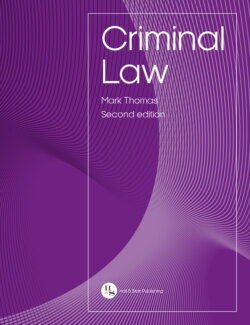Читать книгу Criminal Law - Mark Thomas - Страница 91
На сайте Литреса книга снята с продажи.
Implied duty
ОглавлениеAn example of an implied duty can be seen in the case of R v Instan [1893] 1 QB 450. In this case, the defendant lived with the victim, her aunt, who was taken ill (prior to her death no one but Instan had any knowledge of her aunt’s condition). The victim became bed-bound and was unable to care for herself or call for help. The defendant failed to provide the victim with food or call for medical assistance, but was comfortable in continuing to care for herself (she was happy to eat her aunt’s food). The defendant was convicted of gross negligence manslaughter as a result of the implicit duty of care she held in the given circumstances. Lord Coleridge CJ in the Court for Crown Cases Reserved explained that:
It would not be correct to say that every moral obligation involves a legal duty; but every legal duty is founded on a moral obligation. A legal common law duty is nothing else than the enforcing by law of that which is a moral obligation without legal enforcement. There can be no question in this case that it was the clear duty of the prisoner to impart to the deceased so much as was necessary to sustain life of the food which she from time to time took in, and which was paid for by the deceased’s own money for the purpose of the maintenance of herself and the prisoner; it was only through the instrumentality of the prisoner that the deceased could get the food. There was, therefore, a common law duty imposed upon the prisoner which she did not discharge.
… The prisoner was under a moral obligation to the deceased from which arose a legal duty towards her; that legal duty the prisoner has wilfully and deliberately left unperformed, with the consequence that there has been an acceleration of the death of the deceased owing to the non-performance of that legal duty.
As you can identify from the passage of Lord Coleridge CJ, the precise nature of the duty to act imposed on Instan was not expressly categorised. For example, Hawkins J questioned whether an obligation existed by way of implied contract. However, Lord Coleridge CJ, who provided the judgment of the Court, did not identify the nature of the duty to act; his Lordship merely affirmed that a legal obligation to act in this case existed. In that regard, Instan may be characterised as a case involving an implied voluntary undertaking of responsibility or one of implied contract.
The principle of Instan was applied in the most cited of omissions cases: R v Stone; R v Dobinson [1977] QB 354.
case example
Charge: Gross negligence manslaughter
Case progression: Crown Court – Guilty
Court of Appeal – Conviction upheld
Point of law: Duty to act after assuming responsibility
In R v Stone; R v Dobinson [1977] QB 354, the victim (Fanny) suffered from anorexia and came to live with her brother (Stone) and his mistress (Dobinson). The victim was, at first, able to care for herself; however, her condition quickly deteriorated to the extent that she became bed-bound. The victim required urgent medical assistance which was not summoned and she died as a result of the lack of care received. The defendants were charged with and convicted of gross negligence manslaughter as a result of their failure to care for the victim upon the assumption of her care when she first came to live with them.
The Court of Appeal upheld their convictions on the basis that the pair had voluntarily assumed responsibility over the wellbeing of the victim and as such owed a duty of care to her which, if breached (as it was), was capable of amounting to a crime.
Lord Justice Lane explained the duty to act on Stone and Dobinson as follows:
Whether Fanny was a lodger or not she was a blood relation of the appellant Stone; she was occupying a room in his house; the appellant Dobinson had undertaken the duty of trying to wash her, of taking such food to her as she required. There was ample evidence that each appellant was aware of the poor condition she was in …
This was not a situation analogous to the drowning stranger. They did make efforts to care. They tried to get a doctor; they tried to discover the previous doctor. The appellant Dobinson helped with the washing and the provision of food. All these matters were put before the jury in terms which we find it impossible to fault. The jury were entitled to find that the duty had been assumed. They were entitled to conclude that once Fanny became helplessly infirm … the appellants were, in the circumstances, obliged either to summon help or else to care for Fanny themselves.
This case is often viewed as harsh in nature. Both defendants were of low intelligence and struggled to care for themselves (Stone being partially deaf and almost entirely blind, and Dobinson being described as ‘ineffectual and inadequate’). Stone and Dobinson demonstrates a wide extension of the test set in Instan, given that a duty was held to be owed by the defendants even in circumstances where it was burdensome, difficult or onerous to perform. Williams (‘Criminal Omissions—The Conventional View’ [1991] 107 LQR) described such a decision as a demonstration of ‘judicial cruelty’ given the characteristics of the defendants. Further, what is not clear from Stone and Dobinson is whether the defendants would have remained liable had they simply ignored the victim and not attempted to care for her. I would submit that they would have been liable given that the victim still came to live with the defendants. Although she was able to care for herself at first, the defendants would have assumed a duty as a result of taking Fanny into their home.
